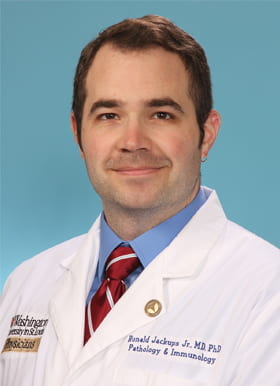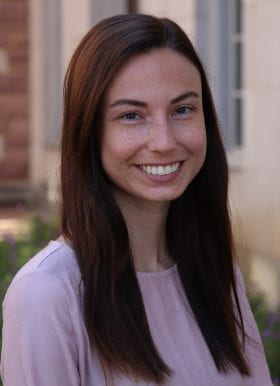The Institute for Informatics, Data Science and Biostatistics and the Department of Pediatrics are pleased to offer the Clinical Informatics (CI) Fellowship at Washington University School of Medicine. The fellowship is accredited by the Accreditation Council for Graduate Medical Education (ACGME).
Clinical Informatics is one of the newest American Board of Medical Specialty subspecialties, which focuses on biomedical data, computational systems, and clinical process improvement applied to the practice of medicine.
The mission of this fellowship is to create leaders in health informatics. The fellowship is designed to meet the training requirements for ACGME board certification in clinical informatics and includes graduate coursework in biomedical informatics.
“The faculty are approachable and invested in allowing me to take on projects that I find interesting and useful. I feel that the fellowship has prepared me to contribute to the field after graduation.”
Mackenzie Hofford, MD, former fellow
Applications to the clinical informatics fellowship program must be submitted through the Electronic Residency Application Service (ERAS). The fellowship can be found on the ERAS/AAMC website under Clinical Informatics (Pediatrics). Paper applications will not be accepted. Applications to the Washington University Clinical Informatics Fellowship Program for the 2024 cycle will open in July 2023.
- Program Name: Washington University/B-JH/SLCH Consortium Program
- Specialty: Clinical Informatics (Pediatrics)
- ACGME ID: 3222832001
For general questions, please contact Katie Bay at k.bay@wustl.edu, or Andrea Krussel at krussela@wustl.edu.
Fellows participate in the design and implementation of electronic health records and clinical decision support systems at Barnes-Jewish Hospital and St. Louis Children’s Hospital. Fellows also participate in research opportunities to advance the science of applied clinical health informatics, including presentations at local and national meetings, as well as scientific papers for publication and grant application. Working on and managing various projects is a major component of the fellowship program.
Clinical Informatics Fellows will have the opportunity to earn a graduate certificate in biomedical informatics. Fellows will also engage in rotations through a variety of areas based off their interests and experience, which have included:
- Center for Clinical Excellence at BJC HealthCare
- McDonnell Genome Institute
- Institute for Informatics
Program Director

Ronald Jackups Jr, MD, PhD
Program Director, Clinical Informatics Fellowship
- Email: rjackups@nospam.wustl.edu
Associate Program Directors
Mackenzie Hofford, MD
Andrew Michelson, MD
Kevin O’Bryan, MD
Affiliated Faculty
Victor Brodsky, MD
Geoff Cislo, MD
Clay Dunagan, MD, MS
Matthew Gerling, DO
Divya Kapoor, MD
Albert Lai, PhD, FACMI, FAMIA
David Molter, MD
Vamsi Narra, MD
Philip Payne, PhD, FACMI, FAMIA, FAIMBE, FIAHSI
Dick Taylor, MD
Michele Thomas, MD
Adam Wilcox, PhD, FACMI
Trainees
David Gootenberg, MD, PhD
Medical School: Harvard Medical School
Residency: Boston Children’s Hospital, Pediatrics
Patricia Hernandez, MD
Medical School: Pontifical Catholic University of Campinas
Residency: Washington University in St. Louis, Clinical Pathology
Alexander Plattner, MD, MBA
Medical School: The University of North Carolina—Chapel Hill School of Medicine
Residency: St. Louis Children’s Hospital, Pediatrics
Christopher Zarbock, MD
Medical School: University of Wisconsin School of Medicine & Public Health
Residency: University of Minnesota, Clinical Pathology
Training covers both adult and pediatric patients at Barnes-Jewish Hospital and St. Louis Children’s Hospitals, both of which use the Epic electronic health record system and Cerner Millennium laboratory information system. Fellows will also spend one month at the John Cochran Division Hospital of U.S. Veterans Affairs. Fellows are also expected to practice medicine part-time to maintain their clinical skills.
- Who is eligible to apply?
Applicants must have completed an ACGME-accredited residency or a Royal College of Physicians and Surgeons of Canada (RCPSC) or College of Family Physicians of Canada (CFPC)-accredited residency program. We consider applicants from all types of residency programs! Applicants also must be eligible to work in the U.S. - What is the duration of the CI fellowship?
The duration of the fellowship is traditionally two years. - Can this fellowship be combined with other fellowships?
Yes! Our most commonly combined specialties are within pathology and pediatrics, but we encourage inquiries from other specialties as well. - Where can I learn about salary and benefits for fellows at WUSM?
Fellow benefit information can be found here and PGY stipend information can be found here. - Is the CI fellowship accredited?
Yes, our fellowship is accredited by ACGME. Fellows will be board-eligible candidates to sit for the clinical informatics subspecialty board examination upon successful completion of the fellowship. - What are a few examples of rotations that fellows complete while in the fellowship?
Fellows will rotate with a wide array of informatics units across the School of Medicine, Barnes-Jewish Hospital, St. Louis Children’s Hospital, and beyond. These rotations provide valuable experience in (but not limited to): clinical decision support, informatics research, electronic health records, pediatric informatics, medical imaging informatics, and data solutions and warehousing. We also offer a number of elective rotations, which are selected based on the fellows’ individual interests and goals. - How do CI fellows maintain their clinical skills?
Fellows will spend 20% of their time in their clinical specialty area to maintain clinical skills and deepen their experience in clinical environments. - What does the coursework component look like with this fellowship?
All fellows will complete a graduate certificate in Biomedical Informatics over the course of two years. - What are the fellows who completed this program doing now?
All of our “graduated” fellows are working in an academic setting, most often in a physician-scientist role in their primary specialty at world-renowned universities. - What is it like to live in St. Louis?
In short, St. Louis is a very affordable city that has something to offer for everyone. St. Louis is often praised for providing the career and cultural opportunities of a big city with the convenience and low cost of living often found in smaller towns. To learn more about living in St. Louis, check out our School of Medicine’s About St. Louis page. - Who can I contact with additional questions?
Please reach out to the senior program manager, Katie Bay at k.bay@wustl.edu, with any questions.
Washington University School of Medicine in St. Louis strives to support all learners, faculty and staff in the academic medical center in providing an environment conducive to learning, research and high-quality patient care. To report a concern regarding mistreatment or unprofessional behavior in the learning environment, please visit safereporting.wustl.edu.
If you’d like to learn more about our medical campus, the surrounding community, or St. Louis, please visit WashU School of Medicine’s About St. Louis page.

Katie Bay
Senior Program Manager, Office of Health Information and Data Science
- Email: k.bay@nospam.wustl.edu